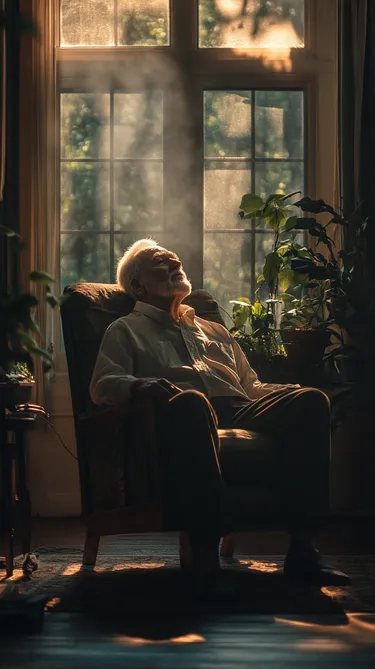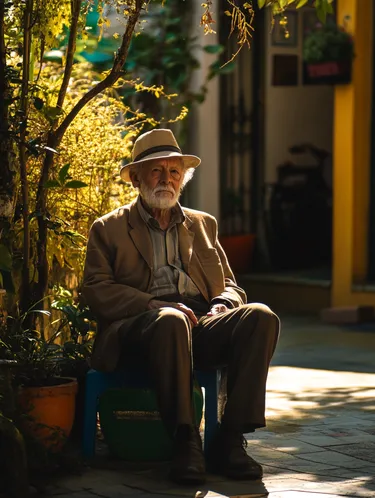
All old Carl had left in life was his house in the middle of nowhere. He lived there alone, wanting peace and quiet. The bank thought otherwise — the land Carl’s house was on had been bought for new construction, and his house was the last to be purchased. But this old man wasn’t giving up easily.
Carl Rogers, a man in his 70s, sat quietly in his living room, the soft light from the late afternoon sun casting a warm glow inside. The walls were lined with old photographs, the faces smiling, frozen in time.
His late wife, Mary, had been in many of them — beautiful and radiant, always by his side. He missed her every day. Since her passing years ago, the house had become his only constant companion.

Without children or close family, Carl lived a life of solitude, surrounded by memories that filled the empty spaces in his home.
His hands rested on a stack of mail piled on the coffee table in front of him. Most of it was from the bank — letters filled with offers, warnings, and even threats.
Carl sighed heavily, his fingers slightly trembling as he flipped through the papers. Every piece of mail demanded the same thing: sell the house.
The bank wanted to buy his land, the last piece in a massive project to build a new commercial center.
All the neighboring homes had been sold, and the land cleared, leaving Carl’s house as the final piece standing in the way of the construction.
But to Carl, the house wasn’t just a building. It was where he had spent decades of his life, raised dreams, worked hard, and loved deeply. Each creaking floorboard and worn-out door held stories, and he couldn’t imagine letting it go.
The bank’s offers were tempting, but no amount of money could replace the emotional ties he had to the place.
Carl’s weathered face hardened with determination. Today was the last day before the bank would take matters into its own hands.
Tomorrow, a lawyer was set to arrive wth construction workers, ready to tear down his home. But Carl wasn’t ready to let go.

He had spent his life building this house with his own hands, brick by brick, and he had no intention of backing down.
This house was all he had left, and if it came down to it, he would fight for it until the very end.
As he sat in the fading light of his living room, Carl made up his mind — he wasn’t going anywhere without a battle.
The next morning, Carl sat by his window, watching the sun rise over the empty fields surrounding his home. He knew today was the day.

The bank had sent notice that a lawyer and a demolition crew would arrive. As he sipped his coffee, a knock at the door echoed through the house. Carl stood up, bracing himself, and walked to the door.
A young woman in a crisp suit stood there, her expression calm but professional.
“Mr. Rogers?” she asked politely. Her name was Helen, and Carl could sense right away that she was ambitious. Her posture, composed face, and sharp eyes told him she was here to do her job, no matter the cost.

“Yes, that’s me,” Carl said, his tone guarded.
Helen stepped forward slightly, her voice steady but with a hint of empathy. “I understand how difficult this must be for you, Mr. Rogers. But the bank is offering you a way out. If you sell now, at least you’ll get something in return. If you wait, they’ll take the house for free. You won’t get anything.”
Carl clenched his jaw, resisting the urge to snap at her. “This house isn’t just a place to live, young lady. This house is my life. I’ve spent decades here. You don’t get to put a price on that.”
Helen nodded, understanding his emotion but keeping her focus. “I know it’s important to you, but this is the best deal you’re going to get. If you sell today, you can still walk away with enough to start somewhere new.”
Carl shook his head, anger rising in his chest. “No, you don’t understand. There is no starting over for me. I won’t sell. Not for the cheap price you’re offering.”
Helen realized that Carl wasn’t going to be persuaded by words alone. She sighed, feeling the weight of her task. “I’m sorry it’s come to this, Mr. Rogers, but I have to call the police now. They’ll ensure you leave the property before demolition begins.”
Carl didn’t flinch. He simply nodded and waited as Helen made the call. Within half an hour, two police officers arrived, along with the construction crew. They gathered near the front door, the tension thick in the air.
One of the officers stepped forward, holding the documents for the demolition.
“We need to check the paperwork before proceeding.”
Carl stared at the officer, then slowly pointed to the address sign by his door. “You’ve got the wrong address,” he said calmly.
The officer paused and glanced at the paperwork, then at the sign. The numbers didn’t match.
The paperwork listed an address different by just one number. Helen’s face went pale with confusion. She had gone over the documents the day before. Everything had been in order. How had this happened?
Carl crossed his arms, waiting as the officer turned to Helen and the construction workers.
“We can’t proceed without the correct paperwork,” the officer said. “We’ll have to delay until this gets sorted out.”
Helen was baffled, but there was nothing she could do. The construction workers grumbled, frustrated, but they packed up and left.
As they drove away, Carl stood on his porch, a sly smile creeping onto his face.
He glanced at the address sign once more, knowing full well that he had changed it the night before.
Later that evening, as the sun dipped below the horizon, casting long shadows across Carl’s yard, there was another knock on the door.
Carl shuffled over, surprised to see Helen standing there, alone this time. Her expression was different from earlier — softer, less rigid.
She didn’t have the same air of determination; instead, there was a quiet understanding in her eyes.
“Mr. Rogers,” she began, her voice gentle. “We know what you did with the address sign, and honestly, it won’t change anything. They’ll fix the paperwork, and tomorrow, they’ll be back. There’s no way around it.”
Carl sighed deeply. He didn’t have the strength to argue. He opened the door wider and gestured for her to come inside.
“You want some tea?” he offered, his voice low and tired. Helen hesitated, then nodded.
They moved to the small backyard, where the evening air was cool and quiet. Carl poured the tea with shaky hands, the weight of the situation heavy on his shoulders. He handed her a cup and then sat down across from her.
For a moment, they both sat in silence, the only sound being the distant rustling of the wind through the trees.
“This house…” Carl finally began, his voice cracking slightly, “it’s all I have left.”
He looked around, his gaze lingering on the walls, the windows, and the worn-out furniture that had been with him for years.
“I built it with my own hands, piece by piece. My wife and I, we spent our entire lives here. She passed on a long time ago, but this house kept me going. Every corner has a memory, every crack tells a story. If I lose it… I don’t have anything else. I’m an old man. I can’t start over at this point. I won’t.”
Helen listened quietly, her hands wrapped around the warm cup. She could see the pain in Carl’s eyes, the weariness of a man who had lived through so much only to find himself in a battle he never wanted.
“I understand, Mr. Rogers,” she said softly.
“My grandfather was a lot like you. He couldn’t let go of the past either. He clung to the things that reminded him of better times, of the people he loved. It wasn’t just about the house — it was about everything the house represented.”
Carl nodded, his throat tight with emotion. “Exactly. This place is my whole life. Without it, I wouldn’t even know who I am anymore.”
Helen set her cup down, her expression thoughtful. “I’ll be honest with you,” she said.
“The bank’s decision might be final. There’s only so much I can do. But I’ll try, Mr. Rogers. I’ll talk to them again and see if there’s a way to help you. I can’t promise anything, but I won’t walk away without trying.”
Carl looked at her, surprised. For the first time, he saw the person beneath the lawyer — a young woman who still had compassion and was willing to listen.
“Thank you,” he whispered. “That means more than you know.”
As the night grew darker, Helen left, leaving Carl alone once again in the house that meant the world to him. He knew the odds were slim, but he felt a small glimmer of hope for the first time in days.
The next day, Helen returned, this time with the construction workers ready to start the demolition.
Carl stood on his porch, bracing himself for the inevitable. He had done everything he could to keep his home, but now, it seemed like his fight was coming to an end.
But as Helen approached, Carl noticed something different about her. She wasn’t carrying the usual paperwork, and there was a softness in her eyes that hadn’t been there before.
She held out an envelope toward him.
“Carl,” she said gently, “I’ve spoken to everyone I could at the bank. They’re not backing down from their plans to take this land, but…” She paused and then handed him the letter.
“They’ve agreed to give you something in return.”
Carl’s hands trembled as he opened the letter. His heart raced as he read the words carefully.
The letter explained that the bank would purchase a house of similar size in a location of his choosing, and it would be fully paid for. Carl couldn’t believe what he was reading.
“How did you manage this?” Carl asked, tears welling up in his eyes.
“No one has ever cared before. Every offer before this was worthless.”
Helen smiled with a sense of pride in her voice.
“I fought for you, Carl. You reminded me of my grandfather, and I couldn’t let them take everything from you without a fight.”
Carl was overwhelmed with gratitude. He stepped forward and hugged Helen tightly.
“Thank you,” he whispered, his voice thick with emotion. “You’ve given me hope when I thought there was none.”
At that moment, Carl knew he had fought until the very end, but Helen’s compassion had made all the difference. He still had his dignity, and now, a new future awaited him.
